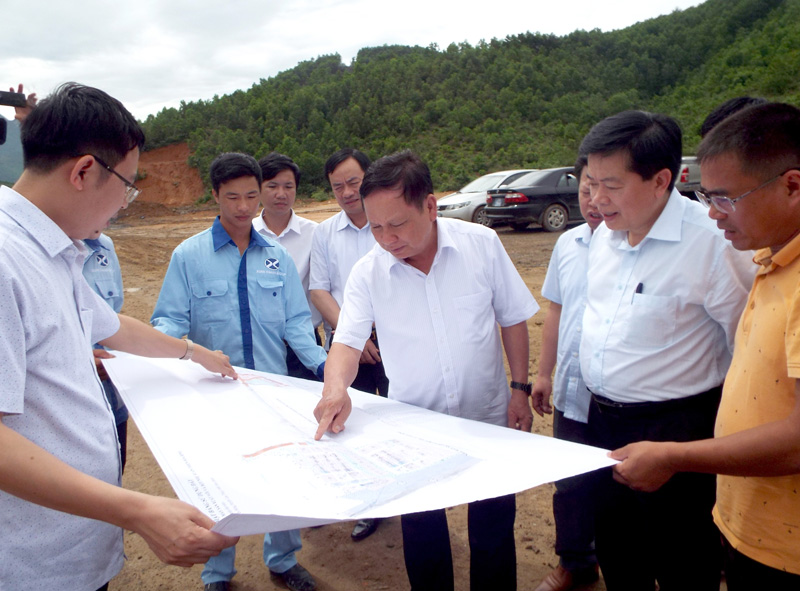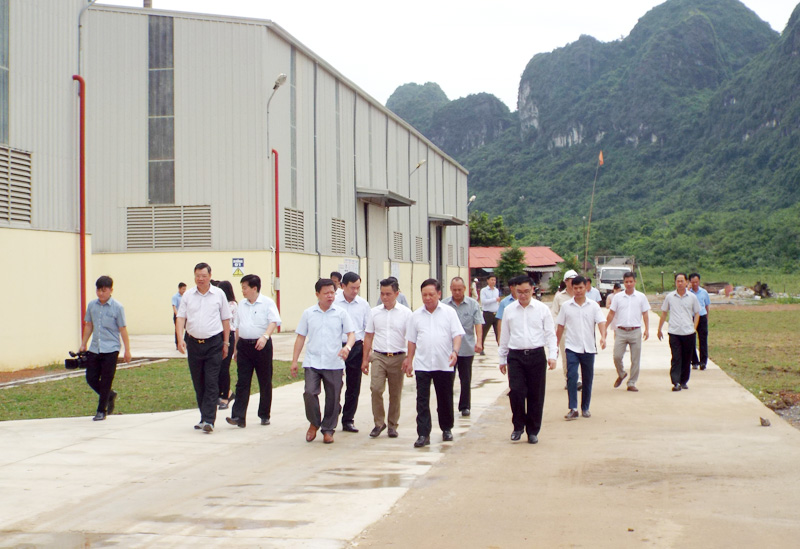
(HBO) - Secretary of the Party Committee of Hoa Binh province Bui Van Tinh on May 12 had a working session with representatives from the Standing Committee of Lac Thuy district’s Party Committee on the implementation of socio-economic development tasks in the first six months of 2018 and solutions for those in the remaining months of the year. The working session also aimed to examine a number of investment projects in the district.
Vice Chairman of
the provincial People’s Committee Nguyen Van Chuong also attended the event.

Secretary of the provincial Party
Committee Bui Van Tinh inspects the project on lime and
light powder production in Xuan Thien port, Lac Thuy district.
In the first half of 2018, Lac Thuy’s
authority carried out many measures to raise the leadership of the Party,
focusing on directing the implementation of socio-economic development tasks,
and obtaining significant results.
Tinh directly inspected a number of key projects
in the district, including the project
on the Xuan Thien lime and light powder production plant in Yen Bong commune, which has total investment
of about 8 trillion VND.

Secretary of the provincial Party Committee Bui Van Tinh inspects the
project on waste treatment plant in Dong Tam commune
Tinh asked Lac Thuy district to have high
political will and spirit of renovation, continue implementing the 12th Party
Central Committee’s Resolution 4 in association with the Politburo’s Directive
05-CT/TW, and accelerate the studying and following of President Ho Chi Minh's thoughts, morals and lifestyle.
The local authority also needs to change
drastically the mindset, renew the leadership mode and improve the efficiency
of its operation, while reviewing socio-economic development plans and
proposing and implementing effectively solutions to economic growth promotion in
connection with developing cultural and social fields and ensuing security and
defence, towards developing Lac Thuy district into a key economic area in
2015-2020 and becoming a new-style rural district, Tinh said.
He also urged Lac Thuy authority to enhance
coordination in helping enterprises and investors to remove difficulties and
speed up the implementation of projects in the locality./.
The Standing Board of the Hoa Binh provincial Party Committee has agreed in principle on a proposal by the Standing Board of the Party Committee of Hoa Binh city to gather feedback on the city’s 1:2000 zoning plan, which forms part of its broader urban development strategy.
Hoa Binh province has made notable progress in public administration reform and digital government development, with the satisfaction index among citizens and businesses reaching over 84%, according to recent government evaluations.
Thanks to great efforts by local authorities in recent times, the governance and public administration performance of Mai Chau district has been significantly improved.
In the afternoon of June 6, the Party Committee, the People's Council, the People's Committee and the Fatherland Front of Lac Son district solemnly held a meeting to celebrate the 139th anniversary of the district's founding (1886–2025) and the 79th anniversary of the establishment of the district's Party Committee (1946–2025). There was the attendance of Mr. Bui Van Thang, the Vice Chairman of the Provincial People's Council; Mr. Quach Tat Liem, the Vice Chairman of the Provincial People's Committee; Ms. Dang Bich Ngoc, the Deputy Head of the National Assembly Delegation of the province; as well as the former leaders of the province and district through various periods, who are the natives of the district.
Implementing the Politburo’s Resolution No. 57-NQ/TW on breakthroughs in science – technology, innovation, and digital transformation is a golden opportunity for the northern mountainous province of Hoa Binh to renew growth model, improve competitive edge and shorten digital gap.
Resolution 57-NQ/TW, issued by the Politburo on December 22, 2024, identifies sci-tech, innovation, and digital transformation as strategic breakthroughs to build a developed and prosperous nation. In Hoa Binh province, this spirit is not just a slogan, it’s being put into action through concrete initiatives that form a "new development triangle”: digital citizenship, digital economy, and digital administration.




